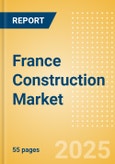The French construction industry is however expected to register an average annual growth of 2.4% from 2026 to 2029, supported by the public and private investments in energy, industrial, and transport projects. Growth over the forecast period will also be supported by the France Railway Network Redevelopment Program, which involves upgrading 800km of railway tracks by 2030, with an investment of EUR1.4 billion ($1.5 billion). The industry’s growth over the forecast period will also be supported by investments as part of the National Hydrogen Strategy, under which, the government plans to invest EUR9 billion ($9.8 billion) by 2030 to strengthen domestic industry and achieve 4.5GW of electrolysis capacity by that year, up from 6.5GW established in 2020. The energy sector will also benefit from initiatives under the third Multiannual Energy Programming (PPE3), which targets the generation of 65-90GW of solar power and 18GW of offshore wind energy by 2035, along with the construction of 14 new nuclear reactors by 2050. For instance, earlier in July 2025, the government signed an agreement with the EU to boost hydropower development as part of Europe’s energy transition. The deal includes constructing new plants, modernizing existing ones, and enforcing strict environmental safeguards such as impact assessments and habitat protection, supported by EU funding and technical aid.
The Construction in France - Key Trends and Opportunities to 2029 (Q4 2025) report provides detailed market analysis, information, and insights into the French construction industry, including:
- The French construction industry's growth prospects by market, project type and construction activity
- Critical insight into the impact of industry trends and issues, as well as an analysis of key risks and opportunities in the French construction industry
- Analysis of the mega-project pipeline, focusing on development stages and participants, in addition to listings of major projects in the pipeline.
Report Scope
This report provides a comprehensive analysis of the construction industry in France. It provides:
- Historical (2020-2024) and forecast (2025-2029) valuations of the construction industry in France, featuring details of key growth drivers.
- Segmentation by sector (commercial, industrial, infrastructure, energy and utilities, institutional and residential) and by sub-sector
- Analysis of the mega-project pipeline, including breakdowns by development stage across all sectors, and projected spending on projects in the existing pipeline.
- Listings of major projects, in addition to details of leading contractors and consultants
Reasons to Buy
- Identify and evaluate market opportunities using our standardized valuation and forecasting methodologies
- Assess market growth potential at a micro-level with over 600 time-series data forecasts
- Understand the latest industry and market trends
- Formulate and validate business strategies using the analyst's critical and actionable insight
- Assess business risks, including cost, regulatory and competitive pressures
- Evaluate competitive risk and success factors








